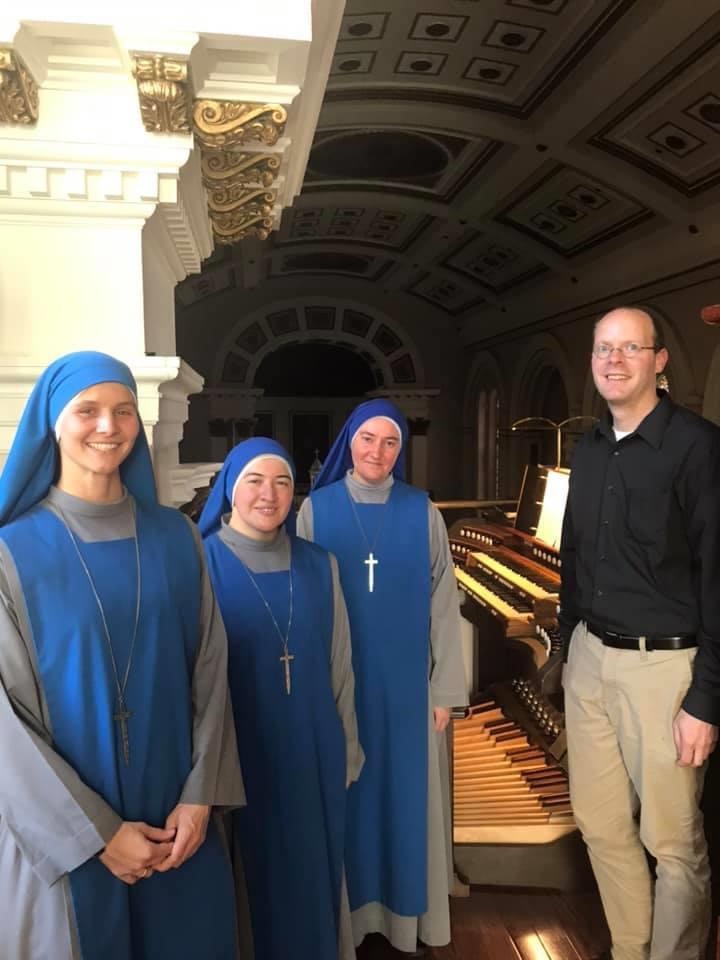The Patroness of Missions, with her parents, visits the Nordic countries.
New Eucharistic Hymns in Spanish
Fr. Andrés Ayala, IVE has composed four beautiful hymns, newly published by the Domenico Zipoli Institute as of June 2020. These are designed for use during meditative moments, such as the four outdoor altars of Eucharistic Processions, the processions themselves, Benediction, or within the Sacred Liturgy of the Divine Office and Holy Mass.
There are four hymn tunes:
Cecilia
Anastasia
Victoria
Gloria
Three of the four hymns are comprised of multiple hymn tunes, to provide variety in the considerable strophic length.
Most importantly, these Sacred hymns are written in the mind of the Church, both Theologically, after the high model of St. Thomas Aquinas, and stylistically, after the supreme model of Gregorian chant.
Humble audio recordings are provided by the religious family of the Servidoras, the Sister Servants of the Lord and the Virgin of Matara.
Hymn for Mary, Mother of the Church
Free from all stain of evil,
From sin of any kind,
Our holy Mother Mary
Was born of lost mankind.
The Father kept her pure
To bear His Son, Christ Jesus,
The Savior of our race.Before the world was fashioned,
Before the dawn of time,
The holy God eternal
Chose Christ’s beloved bride.
He chose the Church in love
To sing the praise of glory:
The riches of His grace.Mary shows forth the beauty
Of God’s eternal plan,
She guides the Church to heaven
As stars guide ships to land.
We follow her, secure,
Though darkness seems prevailing,
To God’s abiding place.Freed from all stain of evil,
From sin of ev’ry kind,
Christ’s Church before the Father
At the appointed time.
O come, Christ, haste the day.
O bring us home with Mary
Before the throne of grace.
Kathleen Pluth
Copyright © 2005 CanticaNOVA Publications. Duplication restricted.
Meter: 7.6.7.6.6.7.6 Suggested tune: Es ist ein Ros’ entsprungen
“The Fire of Your Love”
The music of composer and conductor Paul Jernberg was featured today on EWTN, in a Mass for Pentecost Sunday:
The Mass was recorded in 2019 at the beautiful Church of St. John the Guardian of Mary, in Clinton, Massachusetts.
UPDATE: An interview with Paul Jernberg appeared at New Liturgical Movement a few days ago.
Ascend Your throne, O Righteous One
Ascend Your throne, O Righteous One,
An altar made not out of stone,
That not by hand or skill or trade
But of eternity is made.
And vain the hand that dares to raise
Against this throne of ancient days
A stone or sword of falsity:
Your truth stands through eternity.
And on our altars, Lord most blest,
Take up in majesty Your rest.
Accept the simple gifts we raise;
Accept our faithfulness and praise.
Give us Your life to drink and eat.
Take up, take up Your mercy-seat!
Ascend Your throne, eternal Son,
And lift Your people to their home.
Text: Kathleen Pluth
Copyright © 2005 CanticaNOVA Publications. Duplication restricted.
A Beautiful Vespers
A dozen years ago today, in liturgical time, Wednesday Vespers of the Fourth Week of Easter was celebrated in a special way.
The highlights below present a good example of musical taste, and particular skill in blending the old and the new, from newly composed English antiphons to the Victoria Gloria Patri to the English translation of an ancient Latin hymn. Aside from the momentous character of the occasion, the music set a beautiful example for cathedral and parish Vespers.
Silent Presence
As pastors begin planning to eventually re-open parishes for worship, there is a key fact that must be considered: singing and speaking are propellant activities.
Some studies suggest that speaking alone spreads droplets more than coughing:
Loudon and Roberts investigated the role of singing in the spread of tuberculosis and showed that the percentage of airborne droplet nuclei generated by singing is 6 times more than that emitted during normal talking and approximately equivalent to that released by coughing27. More recent work using advanced particle characterization techniques have yielded similar results21,28,29,30. Chao et al.28 used an interferometric imaging technique to obtain the size distribution of particles larger than 2 μm and found that counting aloud from 1 to 100 releases at least 6 times as many particles as an individual cough. Likewise, Morawska and coworkers21,29 reported that counting aloud for 10 seconds followed by 10 seconds of breathing, repeated over two minutes, releases half as many particles as 30 seconds of continual coughing, which in turn releases half as many particles as saying “aah” for 30 seconds. They also reported that more particles are released when speech is voiced, which involves vocal folds vibration, rather than whispered, which does not.
Much more here.
While surgical face masks do seem to be effective in preventing the virus from spreading by aerosol, homemade masks will vary from this standard in many ways, and may not protect congregations.
While it does seem to be useful to scale the number of allowed congregants to the size of the building, it seems to me that either parishioners should be asked to speak or sing responses internally, or asked to sit farther apart than six feet, or be provided with surgical face masks–which is unlikely at this point but may become possible in the future.




